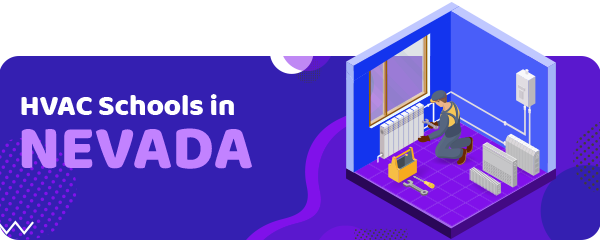Nevada is known for its hot days and cold nights, hence technicians who can work on heating, ventilation and air conditioning are in pretty high demand, making the field a good one to enter for those who like working with their hands.
Article Table of Contents
Salary Expectations
The median salary in the United States for an HVAC technician is $46,648 annually, with those with more skills and experience making $52,858 a year.
In Nevada, the salaries are a little higher, with the median one being $47,814 per year, and the highest ones being around $54,180 per year.
Annual Salary Range:| Location | Avg. Annual Salary |
|---|---|
| Las Vegas | $48,350 |
| Henderson | $48,164 |
| Reno | $46,834 |
| North Las Vegas | $48,350 |
| Sparks | $46,834 |
| Carson City | $47,021 |
| Fernley | $46,153 |
| Elko | $39,697 |
| Mesquite | $47,651 |
| Boulder City | $47,697 |
Regional Salary in Nevada
| Region | Employed | Avg. Annual Salary | Avg. Hourly Pay | Top 10% Annual Salary | Bottom 10% Annual Salary |
|---|---|---|---|---|---|
| Carson City, NV | 80 | $58,600 | $28.17 | $76,830 | $40,170 |
| Las Vegas-Henderson-Paradise, NV | 3,360 | $60,350 | $29.01 | $91,210 | $37,360 |
| Reno, NV | 890 | $61,230 | $29.44 | $86,310 | $38,530 |
* Employment conditions in your area may vary.
Occupational Requirements
HVAC technicians don’t really need a special license to work, though there are some exceptions.
You will be expected to get trained and one of the schools below can help you in this regard.
| School Name | Address |
|---|---|
| Advanced Training Institute | 3970 Las Vegas Boulevard North, Suite B9 Las Vegas, Nevada 89115 |
| Career College of Northern Nevada | 1421 Pullman Dr. Sparks, Nevada 89434 |
| National Technical Institute HVAC Training | 1870 Whitney Mesa Dr, Henderson, NV 89014 |
| Northwest Career College | 7398 Smoke Ranch Rd, Las Vegas, NV 89128 |
| Quality Technical Training Center | 3139 Westwood Dr, Las Vegas, NV 89109 |
| Truckee Meadows Community College | 7000 Dandini Blvd Reno, Nevada 89512 |
If you want to reach your full potential on this job, it’s best if you became a contractor, but for this, you will have to pass an exam and get certified.
Contractor in Nevada
Having an HVAC license will enable you to work as a C-21 contractor for:
- Refrigeration (C-21a)
- Air-Conditioning (C-21b)
- Sheet Metal (C-21c)
- Maintenance (C-21d)
- Solar Air-Conditioning (C-21e)
- Chilled Water (C-21f)
- Piping for Hot Water (C-21g)
In order to apply for the license, you need to meet some requirements first:
- An experience of 4 years over the past 10 years as an HVAC technician
- Schooling cannot count for more than 3 years of the required practical experience
- Submit 4 reference certificates that prove your experience
- Pass a background check
- Send your current financial statements to a CPA
- Pay the $600 exam fees
- The Board decides the bond you must pay, based on the type of license you apply for:
- If your top limit is $1,000,000: the statement must be compiled (or reviewed or audited) by a CPA, self-prepared on a form given by the Board, or using an accounting program and accompanied by an affidavit.
- If you exceed $1,000,000: the financial statement must be reviewed and audited by a CPA.
Your license will have to be renewed once every 2 years.
Reciprocity Agreements
If you got your license in California, Arizona, and Utah and have at least 7 years of experience in either of those states, you can use that license to work in Nevada as well.
Licensing exam
To become C-21 certified, you have to take a trade exam, as well as a business and law exam.
The test lasts for 3 hours, is open-book, and has 85 questions.
It requires a score of 70% to pass.
If you take a trade exam and the Contractor Management Survey Exam, you will have to pay $130.
You only need to pay an $85 fee for a trade exam.
The test subjects cover:
- Piping Insulation Hangers and Supports Sound
- Vibration and Seismic Control, Heating and Cooling Principles, Refrigerants and Refrigeration Load Calculations, Testing
- Adjusting and Balancing Controls, Machine Room A/C
- Heat Pump Equipment; Furnaces and Heaters; Hydronics; Chimneys, Flues, and Vents
- Combustion Air; Fuel Systems; Ducts; Evaporative Cooling; Chillers; Solar Ventilation; and Exhausts Safety
EPA Regulations
The EPA certification is required if you work with refrigerants.
Even if you do not have to work with these right away, having the certification gives you the chance to get better projects.
There are 3 types of EPA certification, and you can choose the one that suits your work most.
Conclusion
The contractor license might not be very easy to get, but it will enable you to perform work in several states and find lucrative projects.
Read the full guide: How to Become an HVAC Technician
